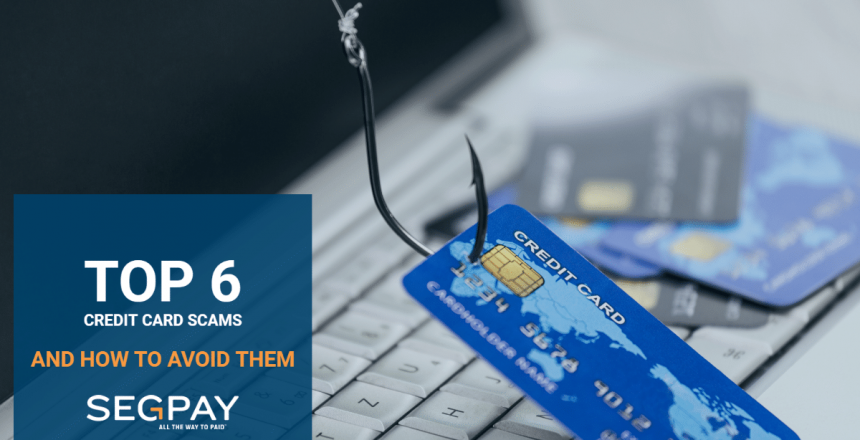- 5 minute read
6 Most Common Credit Card Scams
Credit card scams come in various forms, and scammers are continuously evolving their tactics to deceive unsuspecting victims. Here are six different common types of credit card scams.
1. Phishing
Scammers send fraudulent emails or set up fake websites, often imitating legitimate financial institutions. They aim to trick users into divulging their credit card details, such as card numbers, CVV codes, and personal information. Never click a link from an email or text from an unfamiliar source. To investigate the validity of an institution, use a search engine directly.
Scammers will have a sense of urgency: “We have been trying to reach you” or “Action must be taken immediately.” Any attempt to get you to divulge sensitive information should raise red flags, and always check by calling your credit card company directly before taking any action.
Pay attention to the details. Often there is a small difference in the logo or spelling of the name. The sender’s email address will also be “off” somehow. For example, one phishing scam sends emails to potential victims as if they are from PayPal. Recipients are informed that their account is suspended or frozen for some reason, and they must click the link to go to the site to fix it. Astute observers will notice that the email address uses the spelling “pypal” or “paypl” or some other variation rather than the proper spelling.
2. Card skimming
Scammers use skimming devices to capture credit card information at ATMs, gas stations, or even in restaurants. These devices are designed to read and record the card’s magnetic strip or capture the data entered on the keypad.
These are tricky to avoid. Avoid locations that have had reports of skimming. Also, take a close look at the card reader and keypad. Before you insert your card, try to wiggle the slider. A skimmer will likely give a little or have elements that seem clunky and mismatched with the rest of the machine.
Use mobile wallet options if viable, as they can be a great alternative to pay without the fear of skimming.
3. Donation to charity
Scammers will sometimes pretend to be charitable organizations soliciting financial contributions. Under this philanthropic disguise, scammers will spin a compelling sob story that ends in a request for credit card information. Often these types of scams are run after some tragedy or natural disaster, and the scammer will pose as a member of the Red Cross or some other recognizable organization. They will be well-trained to make persuasive arguments that make it difficult to say no.
In general, be wary of all phone calls asking for credit card information over the phone. If the charity appeals to you and you wish to donate, find the organization’s website and go through official channels. You can also check out the legitimacy of a charity using online tools like CharityNavigator.
4. Identity Theft
In this scam, fraudsters steal personal information, including credit card details, to assume someone else’s identity. They can then use this information to open new credit card accounts, make purchases, or obtain loans in the victim’s name.
Don’t use your credit cards in the open, where anyone can see the information. Take a little extra caution to be discrete and conceal the card number. Don’t use your card to purchase online on public computers or Wi-Fi.
Be wary also of letting your card out of your site. Pay attention when a server leaves with your card. If you can, watch the server as they close your ticket.
5. Fake credit card offers
Scammers may contact individuals with deceptive credit card offers, promising low-interest rates, high credit limits, or guaranteed approvals. Another common variation is a call from a third-party company offering services to help lower the interest rate on a credit card you already own. Victims who fall for these scams might provide personal and financial details, which can be misused for fraudulent activities.
It’s important to remember if it seems too good to be true, it probably is. All decisions regarding credit cards should be made by calling the credit card company directly.
6. Malware and data breaches
Cybercriminals target businesses and financial institutions to gain access to credit card data stored in their systems. They achieve this through malware, ransomware attacks, or hacking. Once they have obtained the information, they can sell it on the black market or use it for unauthorized transactions.
It’s difficult to avoid this one, but if you are notified of a breach, step up monitoring and pay special attention to your statements to ensure you catch any unauthorized charges as soon as possible.
Beat Scammers at Their Own Game
Monitoring services
There are several things you can do to protect yourself. One of the easiest and best ways to avoid credit card scams is to use a monitoring service to catch fraudulent charges before they can do any damage. Many companies offer this service free of charge, check out Forbes’ updated list of the best services here.
Avoid public Wi-Fi
When it comes to using a credit card, avoid using public Wi-Fi, especially when it has no password needed to join. If necessary, ask an employee for the business Wi-Fi name and password, but in general, make all credit card transactions from home.
Call blocking
You can check if a phone number has been identified as involved in a scam by putting the number in quotation marks into a search engine. You can also opt-in for services that block potential scam calls or label them “scam likely” on caller ID. Check out the Federal Communications Commission’s call blocking resources to learn more about how to enable call-blocking and labeling.
How to Spot a Scam
Beyond the commonly documented scams, it’s important to know elements that stay consistent even as fraud attempts evolve and change. Here are some general signs to look for:
- Asking for your Social Security Number: A credit card company will not contact you unsolicited and ask for your SSN, and if you are making a purchase using a credit card, your SSN is not needed.
- Asking for personal information: The same is true of your personal information. There is no need for a credit card company to contact you and ask you for any information. The most likely legitimate scenario is that you are notified about an issue and asked to contact the fraud center. You can do this via the information on the back of your card. If you are contacted and asked for this information, it is likely a scam.
- Contacting users via email or text: An email or text is not how your credit card company will contact you to ask for secure information. If you are contacted this way, ask the company about it. Use the number on our card or statement, not the number provided in the email or text.
Already Been Scammned?
If you have been the victim of a credit card scam, contact your card issuer and open a case immediately. They will likely verify your identity by verifying the last several transactions on your card that you are aware of.
From there, they will open an investigation to determine if you will be liable for the charges. In most cases, these issues are solved quickly and successfully. However, the best option is to use caution and take preventative measures to avoid credit card scams altogether.
Take advantage of any and all fraud protection resources available to you. Payment processors, credit card providers, and even some retailers have safeguards available.
Role of Payment Processors
Payment processors play a crucial role in preventing credit card scams and protecting consumers and merchants from fraud. In a digital climate populated by increasingly insidious credit card scams, consumers hesitate to give out their information online. A secure payment processor can make them feel more confident.
Learn how payment processors help prevent credit card fraud.
Payment processors like Segpay are committed to protecting both consumer information and business profits. Segpay utilizes the most cutting-edge fraud protection to ensure customer information is never breached, and merchants can feel confident in the validity of all their transactions.
Want to learn more about how Segpay can protect your business and help you avoid scams?
Contact us today, we’d love to chat with you about how we can keep your business safe when partnering with us. It’s another way we are here for our merchants All the Way to Paid ™. Reach out to us with your questions at [email protected]



